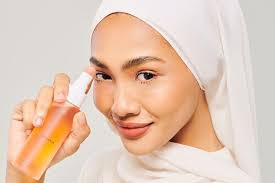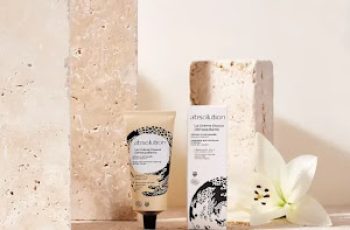Here’s How Muslim Women Can Keep Their Skin Hydrated During Ramadan
Ramadan is here, and it’s a time of prayer for Muslims. During this time, Muslims are encouraged to develop the best version of themselves by practicing solidarity, charity, purity, and generosity. It’s also a time when Muslims fast for 12 to 16 hours a day for 30 consecutive days, abstaining from food and even water.
While the act and duration of fasting can be challenging, it has many benefits for both the body and the mind. Since fasting begins with the consumption of only a small amount of water and goes on for long periods without consuming liquids, it’s still worth asking yourself: How does fasting affect overall skin health? How can fasters keep their skin healthy?
To help, we asked board-certified dermatologist Dr. Kiran Mian of New York City for her advice on how to keep skin hydrated and healthy during fasting. We also asked Muslim women for tried-and-true tips for keeping their skin moisturized during Ramadan. Read below to learn more.
The Importance of Skin Hydration
Water is essential for skin balance. “Without water, many things happen more slowly,” says Dr. Kieran Mian. “The first thing I notice about dehydrated skin due to lack of water is pallor. So the complexion can appear dull.” Mian describes skin as being like a balloon. When filled with air, the balloon has a smooth, even texture; however, when it’s deflated, it sags and looks duller. “This is because our skin cells are essentially 75% water, which helps them stay plump and not shrink,” Mian says. So, if you go too long without water, the surface can become dry and less radiant.
Ingredients That Help Rehydrate During Fasting
While many dermatologists don’t offer direct evidence that water is the only factor in skin hydration, Mian says there are ways to maximize hydration in your daily routine while fasting.
“Use a gentle, creamy cleanser to help lock in moisture,” she advises, adding that Cerave Hydrating Cleanser is one of her favorite formulas. Additionally, Mian suggests looking for products with ingredients like hyaluronic acid, glycerin, squalene, and dimethicone, all of which help the skin retain moisture. For hydration, she recommends formulas like Kiehl’s Ultra Facial Cream with Squalene or La Roche-Posay Cicaplast Baume B5 Multi-Purpose Cream.
If you want to refresh your skin during the day, thermal water sprays are great for replenishing moisture (she likes Avène Thermal Water), Mian says. At night, Mian likes to use a hydrating mask before bed to lock moisture in the skin and minimize the impact of active ingredients. For example, let’s say someone uses a retinoid as part of their daily evening routine during Ramadan. Mian recommends reducing the frequency, as your skin may be drier and more easily irritated. For people in colder climates, she recommends using a humidifier at home to hydrate the skin.
How Muslim Women Can Hydrate Their Skin While Fasting
Many people who celebrate Ramadan have adopted Mian’s tips in their beauty routines. Sahar Kariem, an aspiring stylist and graduate of the Fashion Institute of Technology, likes to use Neutrogena Hydro Boost Water Gel morning and night to replenish moisture. For a radiant complexion, she uses Gleamin’s Vitamin C Clay Mask. “It makes me look radiant and glowy, which is great because my sleep schedule is disrupted during Ramadan, so it refreshes my skin,” she says.
Narjis Hussain, a beauty, lifestyle, and humble fashion influencer from Chicago, exfoliates twice a week and follows up with a moisturizer and mask. She also diligently uses lip balm to hydrate. While consistency is important for Hussain when using products, she also recommends seeking professional treatment whenever possible. “If possible, consider getting a hydrating facial with a trusted aesthetician at the beginning and end of the month,” Hussain advises.
Final Insights
Fasting is a worthwhile act, and while it can come with its challenges, its mental, physical, spiritual, and emotional benefits are unparalleled. It can be hard to think about your well-being when there’s no time to eat and drink, but the beauty of Ramadan is that it has taught millions of people the art of discipline and the importance of taking care of our bodies, including our skin, to be mindful. May this month bring us closer to our goal of becoming better people, and may our skin thrive along the way.
DQH Can I use salicylic acid first and then vitamin C?
It’s easy to create a skincare routine, but knowing how to use it is another thing entirely. In most cases, if you’re not getting the desired skin results, it could be due to the layering of conflicting ingredients. So, is it possible that salicylic acid and vitamin C are such ingredients? Or are these active ingredients the duo that’s been missing from your skincare routine? If you want answers, stick around because today we are going to explain the benefits of salicylic acid and vitamin C and how they can be used in your daily life.
What are the benefits of salicylic acid for skin?
Salicylic acid is one of the most commonly used beta hydroxy acids and is favored by many people with oily, acne-prone skin. This acid is derived from willow bark, and unlike its water-soluble relatives (called alpha-hydroxy acids), salicylic acid is oil-soluble, which means it can penetrate deeper into the lower layers of the skin. Once it reaches the lower layers, it can help unclog pores of excess sebum, dirt, bacteria, debris, and impurities. This results in clearer skin tones and greater definition.
Not only does salicylic acid benefit the underlying layers, but the outer surface of the skin benefits as well. When applied to the skin, salicylic acid removes the buildup of dead skin cells. This is accomplished by breaking the bonds that hold dead cells to the surface. Over time, this can cause the complexion to look dull and prone to acne, blackheads, and other blemishes.
If you’d like to learn more about salicylic acid and how it can improve your skin, check out this dedicated blog post from a beauty insider.
What are the benefits of vitamin C for skin?
Vitamin C is considered one of the most powerful antioxidants, which means it is very effective at fighting free radicals and preventing them from causing further skin damage. Examples of free radicals include pollution, central heating, UV rays and harsh climate. They attack proteins, fats and cell membranes as soon as they come into contact with the skin, causing signs of premature aging such as fine lines and wrinkles as well as hyperpigmentation, flaky patches of skin and loss of elasticity.
Many people usually prefer to use vitamin C in their morning routine as this ingredient gives the complexion a radiant glow. You’ll also find that vitamin C can target areas of hyperpigmentation, plumping the skin and reducing the appearance of fine lines and wrinkles.
The thing about vitamin C is that there are a lot of outdated studies going back to the 1950s that describe vitamin C as an unstable skin component. Thanks to improvements in modern technology, this is no longer the case as all products now contain a stable form of vitamin C.
Visit The Beauty Insider to learn more about vitamin C. So please check out our blog post.
Can I use salicylic acid first and then vitamin C?
Yes, you absolutely can. In fact, it’s thought that using salicylic acid before using vitamin C ensures it penetrates faster and works faster.
This is an efficient way to utilize two power sources, and the reason has to do with pH. For example, the skin’s natural pH is about 4.7, making it slightly acidic. Salicylic acid and vitamin C are also both acidic, and you’ll find that vitamin C is absorbed quickly into the skin. Therefore, using salicylic acid beforehand can increase the acidity of the skin and allow vitamin C to penetrate into the skin faster.
While this is considered an effective way to combine two powerful ingredients, you need to be aware of your skin type and how it reacts to certain active ingredients. Even people with perfect, normal skin can experience skin sensitivity and irritation. Therefore, always consult a doctor or dermatologist before using any new products on your skin.
It’s also important to follow skin application rules. In this case, you need to use the product correctly to ensure you get the best results for your skin. If you’re not sure what I mean, the basic rule for skin is to start with the thinnest consistency and work your way up to the thickest consistency. This prevents a barrier from forming on the surface, preventing other active ingredients from penetrating the skin.
Can I use salicylic acid at night and vitamin C in the morning?
Yes, absolutely, this is considered the most effective way to get returns without any adverse side effects. This is because there is enough time between applications to ensure that the skin’s pH levels return to balance.
You’ll also find that Vitamin C is rich in antioxidants and is perfect for use in the morning to ensure your skin is protected and looking its healthiest. Due to the small size of salicylic acid molecules, it is an acid that is able to reach the deepest parts of the skin. While this is effective at keeping skin clear, it also increases the risk of irritation and photosensitivity. Therefore, many people prefer to use powerful BHAs in their evening routine without exposure to UV rays, pollution, or harsh weather.
Warning: If you avoid using sunscreen every day, none of these ingredients will do what your skin needs. The combination of chemical peels and powerful ingredients increases the risk of further damage to the skin’s surface. Use SPF 50 every day to keep your skin protected and your lipid barrier healthy, even on cloudy days, keeping your skin in top condition.



